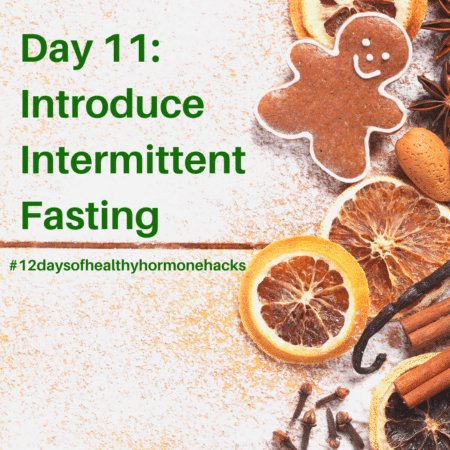 Wholistic Body Logix
Wholistic Body Logix

Day 11: Introduce Intermittent Fasting
#12daysofhealthyhormonehacks
Warning: Consult with your holistic or functional health practitioner before playing around with the concept of this topic if you suffer from more severe stages of adrenal and thyroid dysfunction.
Intermittent fasting is a hot topic in the holistic and functional health industry these days for its therapeutic benefits in aiding to reverse insulin resistance and therefore helping to restore hormone balance and gut health.
You don’t have to be diabetic to have insulin resistance. I see clients all the time who are “eating healthy” and working out, yet they have insulin resistance. So how does this happen and what does it do to your hormones?
Simply put, insulin resistance occurs when your body has become so over saturated with simple carbs and sugars, so the cells of the body that are supposed to absorb glucose literally reject it, leaving sugar circulating in the blood and insulin levels high as a result. Having imbalances in cortisol or leptin hormones, and poor sleep habits are other big contributing factors to insulin resistance as well.
Based on how insulin resistance occurs, it only makes sense that the holiday season is when we can run the risk of developing or contributing to insulin resistance as we indulge in christmas cookies, carb-rich side dishes, other holiday desserts and festive sugar-loaded beverages.
Introducing some intermittent fasting can help to offset this larger than usual intake of carbs and sugars so the body doesn’t become over saturated, thus keeping your insulin levels more normal and promoting better hormone balance.
There are different philosophies around intermittent fasting and it works in different ways for different people. For example, women’s hormones and people who have more severe adrenal or thyroid imbalances are more sensitive to extended fasting periods, so I always recommend easing your way into it.
Here is what I do and what I recommend for my clients as a way to intermittent fast from carbs or sugars specifically:
- Stop eating by 8pm (if you wake up around 6am, if not shift this time earlier or later)
- Fast overnight while sleeping and into the next morning
- You can have a bulletproof style coffee or matcha green tea made with ghee and full fat coconut milk if you feel like you need something
- Have your first “meal” that includes carbs around lunch
This will result in about a 12-16 hour fasting period to give your body a break from carbs or sugars, yet the ghee and/or full fat coconut milk still give your body some fuel.
Introducing intermittent fasting 2-3 days a week can help your body become more “fat adapted”- meaning your body will be able to tap into your own fat stores for fuel and be less reliant on carbs as a source of energy. Being more fat adapted promotes better balance and utilization of the hormone leptin which regulates fat distribution and loss.
I’m definitely planning to do intermittent fasting the morning after Christmas Eve since that is the biggest day of indulgence in our family and I’ll likely do it the morning of as well to prepare my body for the excess of carbs I’m likely to eat.
Intermittent fasting really doesn’t require much work at all, it’s just about being mindful of what you’re putting in your body. If you overindulge, give it a try to help keep your hormones happy this holiday season!
***
Head on over to my Facebook and Instagram or join my FREE group Sexy & Sassy Menopause to see what you might have missed AND to catch the rest of my 12 Days of Healthy Hormone Hacks for the Holidays
P.S. Turn on your notifications so you don’t miss a single simple tip to keep your hormones intact this holiday season, AND remember to save the posts for future reference!
xx Jeannine
